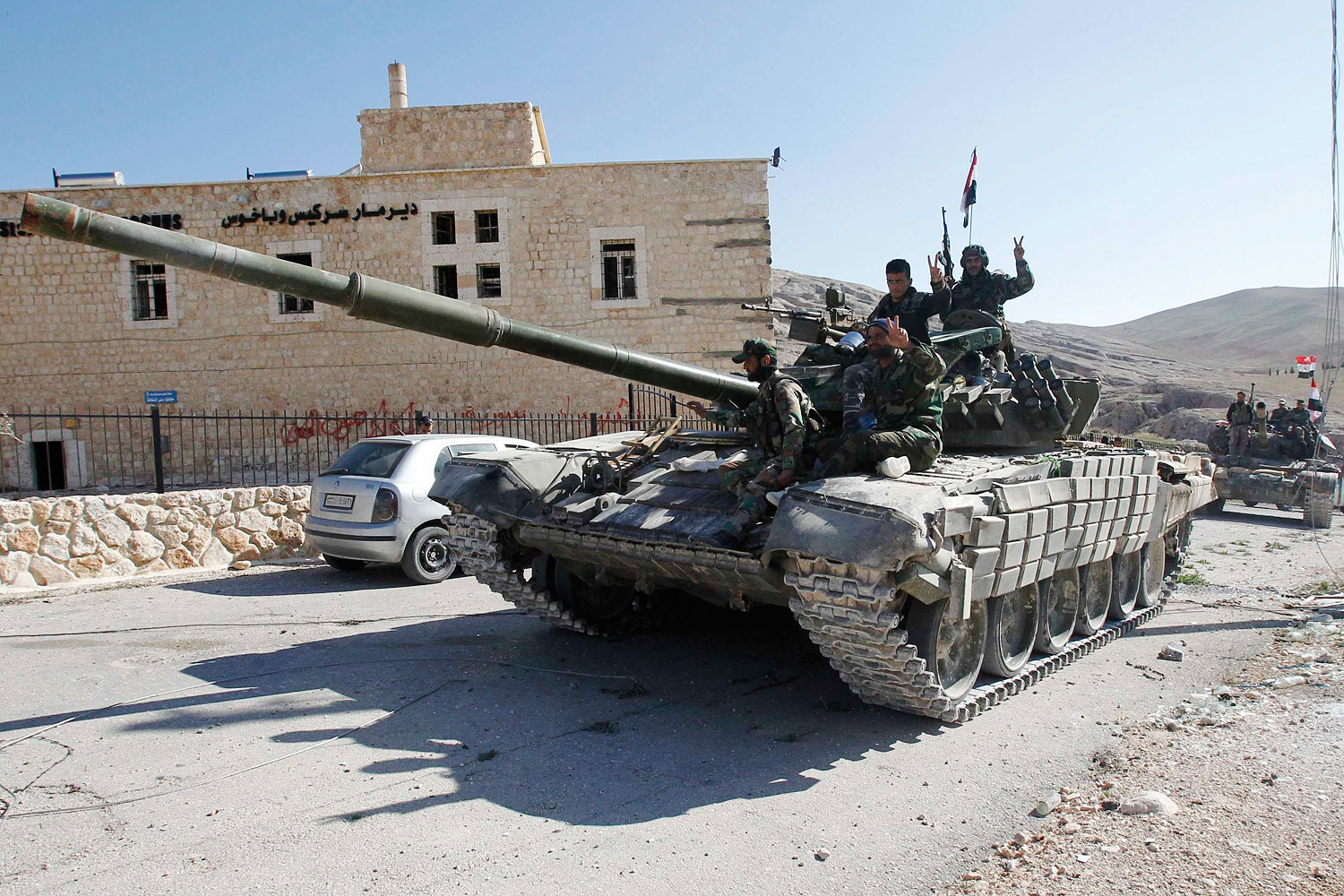
Syrian troops reclaimed the ancient Christian town of Maaloula on Monday, the crowning jewel in a series of significant military gains that had the regime of President Bashar al-Assad crowing over its pending triumph even before the smoke cleared.
The army’s swift capture of Maaloula came less than 24 hours after an Assad speech in which he claimed that the war, now in its fourth year, was going in the regime’s favor. “This is a turning point in the crisis,” President Assad told crowds gathered at Damascus University Sunday afternoon, lauding the “army’s achievements in the war against terror.”
Not long after the conclusion of his speech, Syrian government troops, accompanied by fighters from the Lebanese militant group Hizballah, moved into the few remaining towns along the Lebanese border still in rebel hands. The towns fell like dominoes, depriving opposition fighters of vital supply lines and cutting off access to the rebel-dominated suburbs around the capital, Damascus. The rebel defeat was undeniable.
Still, state TV overstepped in its enthusiasm, claiming military victory over neighboring towns like Jibbeh and Jbaadin that had never been in rebel hands in the first place, according to volunteer observers for the UK-based, anti-Assad Syrian Observatory for Human Rights monitoring group. It appears that regime forces may have taken them pre-emptively, concerned that they might provide refuge for rebels fleeing other areas.
The town of Maaloula, which has changed hands three times since the start of the war, is an important symbol for a regime that has attempted to gain legitimacy by claiming to protect the country’s Christian minority from the threat of radical jihadists. Residents still speak Aramaic, a language dating back to the time of Jesus Christ, and the town was known for its stunning church and monastery carved out of cracks in the surrounding cliff face.
In December, rebel groups affiliated with the al-Qaeda-linked Nusra Front kidnapped 12 nuns from the monastery. In March, the nuns were released unharmed in exchange for scores of government detainees. As they left the nuns praised their former captors, and blessed them in their endeavors in TV appearances — an indication, perhaps, that the rebels were not quite the devils that the regime made them out to be.
Maaloula may have fallen, but all-out victory for the regime is still not guaranteed. Government forces have all but secured a vital corridor linking Damascus to Latakia province on the coast, a stronghold of the Alawite minority to which Assad belongs, but rebel brigades have made inroads in the province’s north, threatening a refuge once thought impregnable. Last month rebels captured the sole remaining government-controlled border post with Turkey, cementing their control of Syria’s entire northern border.
But Assad remains defiant. His comments at Damascus University on Sunday, combined with the regime’s assertions that presidential elections will be announced shortly, make it clear that he will not budge, despite repeated international calls to stand down and reconcile with his opposition. Even if the regime does manage to reclaim significant parts of the country, victory will be hollow. According to a UN report, the Syrian economy is likely to take 30 years to recover to pre-war levels, and that is only if the war ends now. The country’s health system has collapsed, according to Kristalina Georgieva, the European Union’s commissioner for international cooperation, humanitarian aid and crisis response, and a looming drought threatens to deprive a further 2 million Syrians of food this year, according to the World Food Program.
With more than 150,000 dead, thousands missing, nine million displaced and al Qaeda digging deep roots in the country’s northeast, staying in power may take a worse toll on Assad’s government than letting go.
More Must-Reads From TIME
- The 100 Most Influential People of 2024
- The Revolution of Yulia Navalnaya
- 6 Compliments That Land Every Time
- What's the Deal With the Bitcoin Halving?
- If You're Dating Right Now , You're Brave: Column
- The AI That Could Heal a Divided Internet
- Fallout Is a Brilliant Model for the Future of Video Game Adaptations
- Want Weekly Recs on What to Watch, Read, and More? Sign Up for Worth Your Time
Contact us at letters@time.com